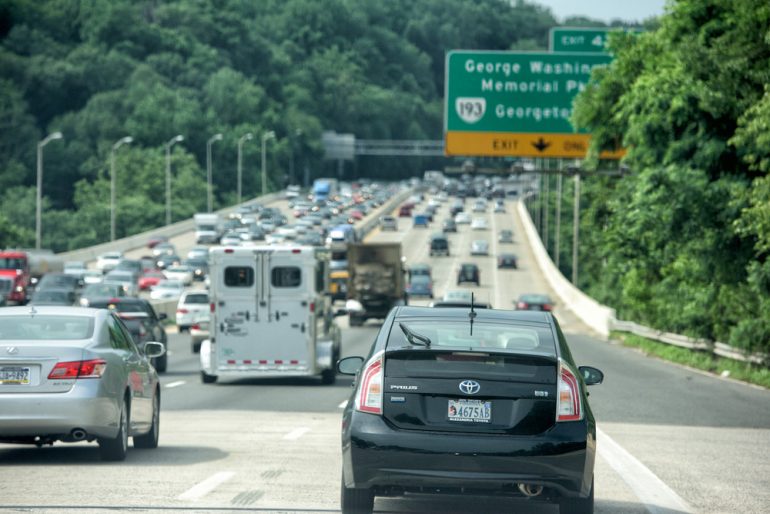ANNAPOLIS, Maryland — The state’s Motor Vehicle Administration is advocating legislation that would transfer regulatory power of self-driving cars to the agency and the state police, saying the change may improve safety on Maryland roads and reduce human error.
Motor Vehicle Administration representative Christine Nizer testified before the Senate Judicial Proceedings Committee Tuesday in favor of the bill, saying that the bill was written to be broad in order to be flexible because the technology for self-driving cars is moving forward so rapidly.
“Autonomous vehicles would be tested on private facilities before they are testing on public roads,” she said. “There’d be a robust process to make sure they are safe before they are put on the road.”
Nizer said that they chose the I-95 corridor because of its proximity to several tech companies.
Sen. Robert Cassilly, R-Harford, expressed his concern about how autonomous cars would handle avoiding accidents. He said he had concerns that the legislature would not have a direct role in regulating autonomous vehicles.
Justin Kintz, a representative from Uber, supported the bill, stating that self-driving cars could lead to fewer driving-related deaths because they were safer than cars driven by humans. He echoed Nizer that developing the technology would take time before it is ready.
Representatives from the Auto Alliance, an advocacy group for the auto industry, expressed opposition to the bill as it is written because it does not contain specific enough language. Bill Kress, a representative from the Auto Alliance, explained that the group had concerns that state regulations and legislation would not match federal regulations and that the authority granted to the state’s Motor Vehicle Administration would be too broad.
In December, the Maryland Department of Transportation submitted an application to to the U.S. Department of Transportation to provide a proving ground for testing self-driving cars, according to a state agency press release.
The testing would occur along the I-95 corridor between the University of Maryland area and the Aberdeen Proving Grounds.
A U.S. DOT representative told the University of Maryland’s Capital News Service Tuesday the agency planned to announce the application approvals some time this week.
The U.S. DOT and the National Highway Traffic Safety Administration updated their policies to encourage the development of autonomous vehicles and technology that could help save lives, according to the Maryland Department of Legislative Services.
Maryland Transportation Secretary Pete Rahn in December 2015 created the Maryland Autonomous and Connected Vehicle Working Group, which examines issues related to the regulation of self-driving vehicles. Nevada and eight other states and Washington, D.C., have already enacted legislation regarding self-driving cars.
The working group recommended that the Maryland Department of Transportation apply for the U.S. DOT program.
The committee also heard testimony regarding a bill — originally titled The Blue Lives Matter Act of 2017 now amended to the Police Protection Act — that would extend Maryland hate crime protections to law enforcement officers.
The bill adds language defining a law enforcement officer and protections given to officers to the existing Maryland hate crimes law.
Sen. Bryan Simonaire, R-Anne Arundel, and his daughter, Delegate Meagan Simonaire, R-Anne Arundel, introduced companion bills in both the Senate and the House of Delegates for the 2017 legislative session.
Sen. Simonaire explained that the bill is not meant to minimize efforts to improve law enforcement and accountability. He showed clips of CNN’s coverage of attacks on police officers in Dallas on July 7.
Sen. Delores Kelley, D-Baltimore County, expressed concern that the bill did not make enough distinction about what would qualify as a hate crime.
The Blue Lives Matter movement started in response to the Black Lives Matter movement and incidents of police officers slain in the line of duty.
Vince Canales, president of the Maryland State Fraternal Order of Police, testified in favor of the bill, citing an increase in ambush attacks against police officers including an incident last year in Prince George’s County in which a man stood outside of a police precinct and opened fire at the building. One officer died due to friendly fire in that incident.
In January 2015, the National Fraternal Order of Police asked that police officers be added as a protected class under federal hate crimes, according to the Maryland Department of Legislative Services.
Some civil rights groups are opposed, however.
“It’s an unnecessary bill. The Civil Rights Act protects things that are innate, race, sex, or religion” said Gerald Stansbury, president of the Maryland State Conference NAACP. “Being a police officer or firefighter is a career, they still have a choice to do that.”
He added that the current hate crimes law is enough to protect firefighters and police officers who may be targeted but that adding language specifically for police officers is unnecessary.
Delegate Steven Arentz, R-Caroline, Cecil, Kent and Queen Anne’s, sponsored a similar bill to expand hate crime protections to include both police officers and first responders such as firefighters or emergency services personnel.
Arentz said the bill he sponsored does not include the language “Blue Lives Matter” because it is a very charged phrase. He sponsored a similar bill last year that did not make it out of committee, which he said left him heartbroken.
-30-

